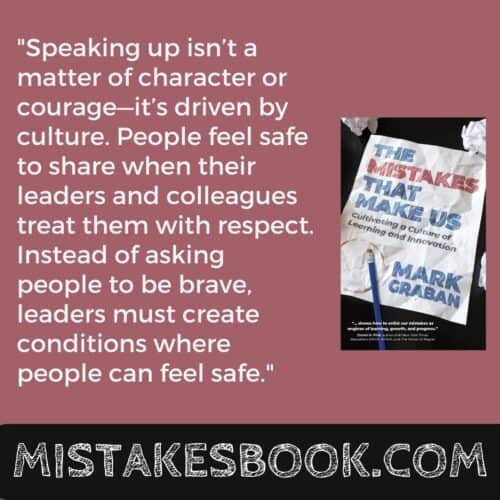tl;dr: In this post, Mark challenges the common notion that speaking up in an organization is solely a matter of individual character or courage. He argues that the willingness to voice concerns or ideas is largely influenced by the culture of the organization. Drawing on Lean principles, Mark emphasizes the importance of fostering a supportive environment that encourages open dialogue for continuous improvement and better outcomes.
This is something from my book, The Mistakes That Make Us: Cultivating a Culture of Learning and Innovation, that I shared on LinkedIn recently.
Here's something I figured out thanks to education in a combination of fields, including Lean management and psychological safety. I wish I had understood this much sooner:
“Speaking up isn't a matter of character or courage–it's driven by culture. People feel safe to share when their leaders and colleagues treat them with respect. Instead of asking people to be brave, leaders must create conditions where people can feel safe.”
You can join the conversation on LinkedIn here:
Hear Mark read this post — subscribe to Lean Blog Audio

Here are some comments from the LinkedIn discussion:
“When you have a great culture of safety, courage isn't needed.”
“Making this about personal courage or character can place unnecessary burden and layer on with the simmering fear…
While our voice can occasionally be bold, out of place, courageous and all that- unless we build and support these behaviors- without censure- we will keep having these conversations.
Thanks for birthing your book- the world welcomes it.”
“Totally agree Mark Graban. Leaders have an important responsibility in creating the environment so people speak up.”
“Creating an environment of psychological safety means leaders have to rethink their roles as facilitators rather than controllers. Leaders need the strength of their own character to understand the group's objective but allow for discussions and ideas that may run contrary to their own. Once they open those doors, great things can start happening.”
Some pushed back on the idea that people's safety to speak up is a matter of culture…
“Thank you, Mark. Likewise, I wish I had understood the nuances of this better and earlier in my career.
I agree with those who hold to a ‘both/and' relationship, with the primary responsibility on the leader to create the culture of psychological safety and respect to allow and invite feedback. In addition, the leader must to listen to understand and take appropriate action, otherwise people will tend to stop giving feedback.
When a leader fails to set a culture for success, team members should have the courage both to speak up and to support each other. The crucial part is what comes next, and how/when corrective actions are implemented by the leader and/or organization.”
I replied to Paul:
“I'm with you until that last paragraph. It's often worse than “the leader didn't listen.”
If leaders punish people for speaking up and providing feedback… asking employees to be “courageous” doesn't seem helpful. The “what comes next” might be the employee getting fired.”
I stand by my original post and comment — instead of telling people they should be courageous, leaders need to reduce fear.
On that note, we'll wrap up with a comment by Joakim Bjurström:
As Deming said: “Drive out fear!”
What do you think? Please scroll down (or click) to post a comment. Or please share the post with your thoughts on LinkedIn – and follow me or connect with me there.
Did you like this post? Make sure you don't miss a post or podcast — Subscribe to get notified about posts via email daily or weekly.
Check out my latest book, The Mistakes That Make Us: Cultivating a Culture of Learning and Innovation:








